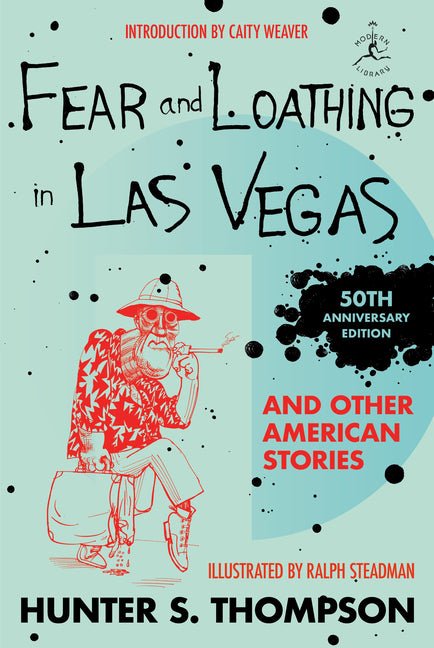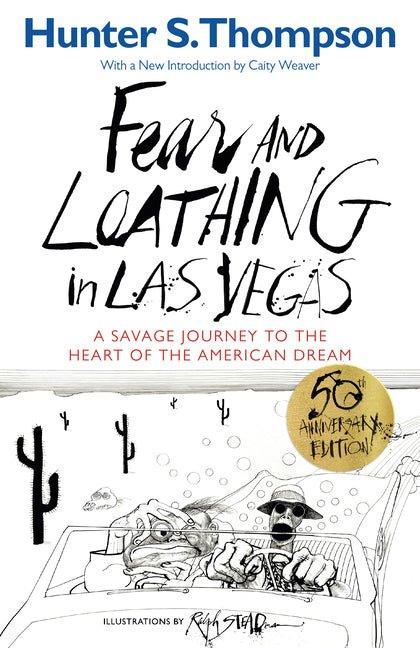Modern Library
Fear and Loathing in Las Vegas and Other American Stories
Couldn't load pickup availability
A fiftieth-anniversary edition of the cult classic of gonzo journalism, hailed as “the best book on the dope decade” (The New York Times Book Review), featuring Ralph Steadman’s original drawings and an introduction by Caity Weaver
The inspiration for the major motion picture directed by Terry Gilliam, starring Johnny Depp and Benicio del Toro
“A scorching epochal sensation!”—Tom Wolfe
First published in Rolling Stone magazine in 1971, Fear and Loathing in Las Vegas is the best chronicle of drug-soaked, addle-brained, rollicking good times ever committed to the printed page. It is also the tale of a long weekend road trip that has gone down in the annals of American pop culture as one of the strangest journeys ever experienced. The writer’s account of an assignment he undertook with his attorney to visit Las Vegas and “check it out,” the book stands as the final word on the highs and lows of the 1960s, one of the defining works of our time and a stylistic and journalistic tour de force.
Share
Book Details
ISBN:
9780679602989
EAN:
9780679602989
Binding:
Hardcover
Pages:
320
Authors:
Hunter S Thompson
Illustrators:
Ralph Steadman
Publisher:
Modern Library


This book is amazing, but I won't rehash the praise it has already received.To find out why 60's counter-culture failed, and how a grotesque incarnation of Americana was reinstituted in the 70's, look no further than Fear and Loathing. Thompson's twisted observations on life in Las Vegas in the early 70's provide some of the most brilliant insight on the absurdity of what could be construed as Horatio Alger's vision for America. "Here I was, alone in Las Vegas, with this goddamned incredibly expensive car, completely twisted on drugs, no cash, no story for the magazine. And on top of everything else I had a gigantic goddamn hotel bill to deal with...How would Horatio Alger have handled this situation?" Absurd to think about, right? Well so is just about every other question that Thompson poses throughout the book.As one reads through FLLV, one realizes that although Thompson came to terms with the inherent fallacy of the the counter-cultural revolution, he never came to terms with its decline and demise. As such, he is a cultural refugee, a living anachronism."No more of the speed that fueled that 60's. That was the fatal flaw in Tim Leary's trip. He crashed around America selling "consciousnes expansion" without ever giving a thought to the grim meat-hook realities that were lying in wait for all the people who took him seriously...All those pathetically eager acid freaks who thought they could buy Peace and Understanding for three bucks a hit.""My heart was filled with joy. I felt like a monster reincarnation of Horatio Alger"These two beautiful excerpts summarize the essence of the book - that although the the spirit that fueled the sixties ultimately succumbed to the mainstream, that spirit was unique and could not and cannot ever be found again."...the middle sixties was a very special time and place to be a part of. But no explanation, no mix of words or music or memories can touch that sense of knowing that you were there and alive in that corner of time and the world. Whatever it meant."
For those of us who never smoked dope or attended an AA meeting, Mr. Thompson allows us a glimpse into an overly medicated mind. The result is both humorous and sad.The plot: Journalist, Thompson, travels to Las Vegas with his Samoan attorney to cover a dirt bike race and a convention of District Attorneys, who are gathering to discuss America's drug problem. Of course, the real story is the obscene amount of drugs that Thompson and his attorney absorb, and the bizarre interactions those two have with the unlucky sober.Yes, it's very funny. I especially enjoyed Thompson's blow by blow description of DAs trying to come to grips with the "drug crazed" of 1971, betraying the full depths of their ignorance. No wonder the drug problem has only become worse since then.While I laughed, however, a strong undercurrent of sadness stuck with me throughout the book. Each chapter includes at least one drug-charged encounter of Thompson and his attorney with an unfortunate, wide-eyed waitress, cop, concierge, bar tender, pedestrian or average Joe. For those who have friends or family member suffering from drug addiction, you will sympathize with these poor people. The author wrongly suggests that he repeatedly fools people with his antics; rather, what most likely happened from the perspective of his sober observers was that they saw no point in challenging an obviously drug deranged psycho.While it was funny and poignant, I give this book 4 stars because it could have been better. Thompson was able to write this book on drugs because he carried a recorder with him at all times. After a drug binge, he would return to the tapes and weave them into a somewhat coherent story when he was more sober. But he still could have added more meaning. For example on page 179 he makes several insightful comments about the meaning of the 1960's, but cuts them short. Too bad, really. Thompson obviously had more to say of real meaning, but he was too high to do it.The irony of the book is that the heroes (if you can call them that) were searching for the "American Dream." Thompson merely showed us some of the worst aspects of American life. By killing himself lately, he added the final blow to that story.
Is this book misprinted for anyone else? Chapters and page numbers are all out of whack. I assume it could be just HST style of writing but then again it’s terribly off lol. I’m not mad, it’s just strange.
Well I didn't hate this story, but I think I got high just reading it!! I don't know what to say about Thompson except read this this story because it makes you wonder !!!!!!
Pumping up the tires on your car to 75 psi is NOT going to make it corner any better


